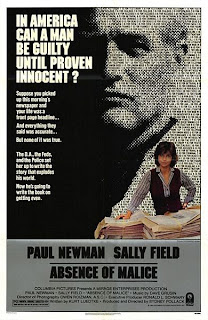Absence of Malice

The early to mid-eighties saw a bit of a renaissance for Paul Newman, as he became an eminence grise and was making prestigious pictures again. After a fourteen-year absence from Oscar nominations, he would receive three in six years in the eighties. The first of these came for Absence of Malice, a solid drama from Sydney Pollack.
Newman stars as the son of a deceased organized crime figure who is living a straight life as a legitimate businessman, but when a union leader goes missing a government investigator decides that Newman must be involved. He uses a newspaper reporter, Sally Field, to leak the story to, and Newman's reputation is ruined. Things turn tragic when Newman's friend, Melinda Dillon, has a terrible secret revealed in print.
Written by an ex-newspaperman, Kurt Luedtke, the film takes a cynical look at the press, and how the single-minded pursuit of the truth can destroy lives. It's a meaty subject, and handled delicately, though it's not a particularly exciting film. Part of the problem is that Field is woefully miscast. Field can be a fine actress, but she is unconvincing as a hard-nosed reporter, and their is no chemistry between her and Newman in an ill-conceived romantic subplot.
Better are Bob Balaban as the weasely investigator, and Wilford Brimley has a memorable turn as his boss, who comes to town to clean up the mess. This is the kind of role that got Brimley those Quaker Oats commercials, as who can't listen to this guy and believe that he knows exactly what he's talking about? He memorably says in the film, during an inquiry, "I've leaving with somebody's ass in my briefcase."
It's also interesting, with the rapid changes in technology, how quickly a picture can be dated by the equipment it uses. This film has it's reporters using primitive word processors, but newspapers in those days were still cut and pasted with the use of compositors and that glue that gives me a Proustian rush back to my days on the college newspaper.


Comments
Post a Comment